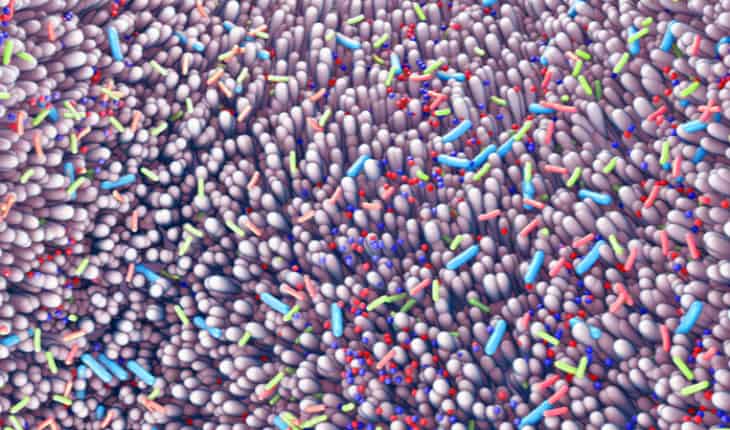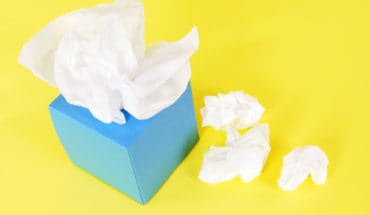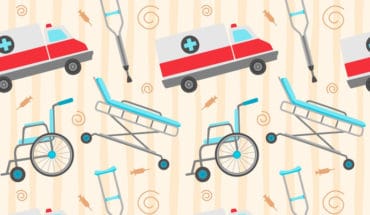Using the microbiome to promote muscle growth in muscle loss conditions such as ageing and cancer: If further research can identify the substances that the bacteria of the gut are making to help muscles grow following exercise, we might be able to use some of those substances to promote the growth of muscles in people suffering from the loss of muscle as typically seen with aging or cancer.
That’s according to new research published today in The Journal of Physiology.
The researchers found that for muscles to grow following exercise, an in-tact microbiome was necessary in mice.
The gut microbiome refers to the trillions of bacteria (and other microbes) that live inside our digestive systems (1). Over the last decade, research has found that these bacteria make substances that are needed for our health.
Some of these studies provided intriguing evidence suggesting the gut microbiome may also be important for the health of skeletal muscles (2, 3 4). But is a healthy gut microbiome necessary for skeletal muscle to adapt to exercise?
To answer this question, the researchers let mice voluntarily exercise on running wheels every day for nine weeks with some mice administered antibiotics through their drinking water. The antibiotic treatment killed the bacteria of the gut microbiome.
They then compared the muscles of healthy mice to the mice without an intact microbiome to see if the muscles adapted differently to wheel running.
They found that the muscles of mice without an intact microbiome did not grow as much as the muscles of healthy mice, even though both groups of mice ran the same amount over the nine weeks of wheel running.
These findings indicate a healthy gut microbiome is necessary for skeletal muscles to fully grow after exercising.
The findings from this new study contribute to the growing body of evidence showing a connection between the gut microbiome and skeletal muscles. The findings suggest the gut microbiome makes substances that help skeletal muscles to become larger after exercising.
Although the researchers used a relatively low dose of antibiotics compared to previous studies, a limitation of the study is that they do not know if the antibiotics might have directly affected the ability of skeletal muscle to adapt to exercise.
They also only used female mice in this initial study so they do not know if the findings will be the same in male mice. Finally, as with all animal studies, they do not know if the findings will translate into humans.
Taylor Valentino, first author on the paper said: “If we can identify the substances that gut bacteria are making to help muscles growth after exercise, we might be able to use some of those substances to promote the growth of muscles in people suffering from the loss of muscle as typically seen with aging or cancer. ”
John McCarthy, senior author added “From an athletic standpoint, world-class runners were found to have more of a particular type of bacteria that provided an additional source of energy which was thought to help them run faster (5). Thus, the gut microbiome makes substances that appear to be important for skeletal muscles to fully adapt to exercise as well as help improve athletic performance.”
“We are currently trying to determine how exercise changes the composition and function of the gut microbiome. This investigation, along with other studies in bacteria, will allow us to identify the substances made by the gut microbiome that help skeletal muscle to grow larger in response to exercise.”
- Berg, G., et al., Microbiome definition re-visited: old concepts and new challenges. Microbiome, 2020. 8(1): p. 103.
- Lahiri, S., et al., The gut microbiota influences skeletal muscle mass and function in mice. Sci Transl Med, 2019. 11(502).
- Bindels, L.B., et al., Restoring specific lactobacilli levels decreases inflammation and muscle atrophy markers in an acute leukemia mouse model. PLoS One, 2012. 7(6): p. e37971.
- Yan, H., et al., Gut microbiota can transfer fiber characteristics and lipid metabolic profiles of skeletal muscle from pigs to germ-free mice. Sci Rep, 2016. 6: p. 31786.
- Scheiman, J., et al., Meta-omics analysis of elite athletes identifies a performance-enhancing microbe that functions via lactate metabolism. Nat Med, 2019. 25(7): p. 1104-1109.
- Dungan, C.M., et al., Elevated myonuclear density during skeletal muscle hypertrophy in response to training is reversed during detraining. Am J Physiol Cell Physiol, 2019. 316(5): p. C649-C654.0
- Full paper title: Dysbiosis of the Gut Microbiome Impairs Mouse Skeletal Muscle Adaptation to Exercise Link to paper https://physoc.onlinelibrary.wiley.com/doi/abs/10.1113/JP281788 (link will only work after the embargo date. Before then, please email the press office for a copy of the paper)
- The Journal of Physiology publishes advances in physiology which increase our understanding of how our bodies function in health and disease. http://jp.physoc.org
- The Physiological Society brings together over 4,000 scientists from over 60 countries. The Society promotes physiology with the public and parliament alike. It supports physiologists by organising world-class conferences and offering grants for research and also publishes the latest developments in the field in its three leading scientific journals, The Journal of Physiology, Experimental Physiology and Physiological Reports. www.physoc.org
- Gut microbiome could delay onset of type 1 diabetes - 3rd April 2025
- The da Vinci 5 Robot Is Set To Transform Bariatric Care: - 31st March 2025
- Beyond money: the hidden drivers fuelling child food insecurity - 31st March 2025






